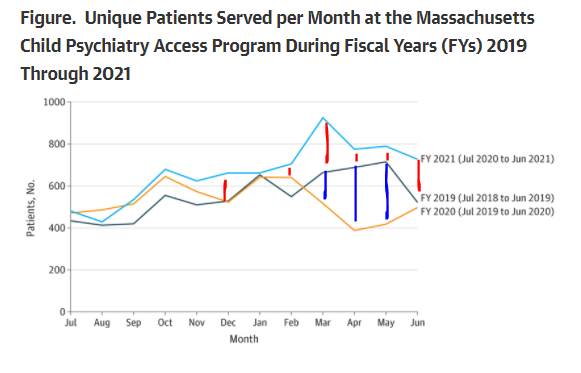
Thrilled to announce that with @QdQwerty and colleagues, we have published very timely description of pre-pandemic mental health. Congratulations to Dr. Alison Lee for the hard work on the publication, and proud to be a part of it.
Let's take a look!
academic.oup.com/pch/advance-ar…
/1
Let's take a look!
academic.oup.com/pch/advance-ar…
/1

In this study, we took a look at the types of mental health presentations for kids over a 3y period. We used the HEARTSMAP, a reliable tool for helping emergency departments document psychosocial assessments and help with treatment planning.
jpeds.com/article/S0022-…
/2
jpeds.com/article/S0022-…
/2
In total, we looked at the HEARTSMAP data for 1,530 kids.
Broken down by the HEARTSMAP domains:
PSYCHIATRIC: 40% with severe concerns
SOCIAL: 27% moderate/severe concerns
YOUTH HEALTH: 22% moderate/severe concerns
/3
Broken down by the HEARTSMAP domains:
PSYCHIATRIC: 40% with severe concerns
SOCIAL: 27% moderate/severe concerns
YOUTH HEALTH: 22% moderate/severe concerns
/3

The HEARTSMAP triggered recommendations for psychiatric consultation in about half of the patients. Within, suicidal ideation was the majority concern.
Crisis response teams were needed in about 1/3 of those cases, & child and youth mental health teams another third.
/4
Crisis response teams were needed in about 1/3 of those cases, & child and youth mental health teams another third.
/4

While the crisis teams had response times within a 72-hour window, the majority (60%) of the youth mental health teams had wait times of over a month.
Wait times for MH programs:
< 1 week 7%
1-4 weeks 13%
1mo to 3mo: 31%
3mo to 6mo: 18%
>6 mo: 9.3%
/5
Wait times for MH programs:
< 1 week 7%
1-4 weeks 13%
1mo to 3mo: 31%
3mo to 6mo: 18%
>6 mo: 9.3%
/5
We hope our study highlights how complex ER presentations are. Many of our cases have a mixture of health, social, and psychiatric concerns and rapid access given emergency presentation is obviously key. Months of wait for a child can be an entire school year.
/6
/6
If you've been following me , you know that I've been talking about PREPANDEMIC conditions that need correction (we can't 'go back to normal'), it's so important that we don't lose sight of this.
/fin
/fin
If you are an Emergency Department or a Clinical Team and you are interested in the HEARTSMAP, check it out here:
openheartsmap.bcchr.ca
openheartsmap.bcchr.ca
• • •
Missing some Tweet in this thread? You can try to
force a refresh






